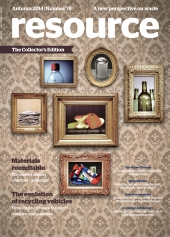Nelson's Column: End destinations
Resident columnist Horatio Nelson considers whether there should be more transparency with recycling end destinations.
There is a growing need for recycling to be backed by a transparent evidence trail. In the age of hysterical newspaper claims (mentioning no names) and documentaries visiting far-flung dumps, confidence is easily shaken. If I had a pound for every time a member of the public expressed doubts about recyclables’ fate I’d be permanently sunning myself in one of those far-flung destinations.
 This article was taken from Issue 78
This article was taken from Issue 78Now, signs are that the European Commission is going to change how we record recycling figures to ensure they’re based on weighbridge figures of material actually recycled, not just collected.
This is standard for much of Europe, but not the UK, where all exported paper, plastic and other green list recyclate is considered 100 per cent recycled. Domestic reprocessors, however, can’t make such a claim as they are subject to audit by the Environment Agency in an uneven playing field that is starting to be addressed. Recyclate is a global commodity, and there is nothing wrong with exporting it, but exporters need to improve their evidence trail and own up to process loss and contamination.
At the heart of the problem is the purported obstacle of ‘commercial confidentiality’, but this is overplayed, as the price of the commerce need not be revealed. The issue is that merchants might be driven out of business as collectors identify the foreign reprocessors, but this is a bit of a bald claim. Any foreign reprocessor worth his salt, and there are many, is not in the business of hiding from sight. As long as the merchant adds value to the process, then he has a place and will remain – if he doesn’t then I see no place for him anyway, and the recycling industry will be better for it.
The bottom line is that the demand for transparency and an even playing field is not going to recede; good exporters should embrace this.



